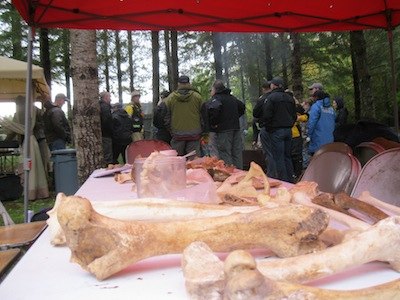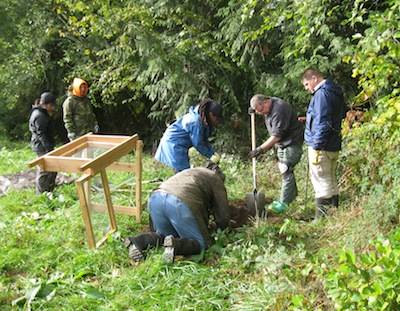
Washington state forensic anthropologist Dr. Kathy Taylor gives instructions to participants before they start looking for signs of buried “bodies.”
By Sharyn L. Decker
Lewis County Sirens news reporter
CHEHALIS – Dr. Kathy Taylor reads bones.
The state forensic anthropologist works at the King County Medical Examiner’s Office but assists agencies all around Washington when they need an expert.
Detective Kathleen Decker, of the King County Sheriff’s Office, has been a tracker for 20 years. She can read blades of grass at an outdoor crime scene and count, for example, how many people have been there.
Sharon Ward is a Portland attorney by day, but she’s also a tracker. And a handler for a human remains detection dog. Her 2-year-old Rottweiler Vali’s nose is so discerning, he knows the difference between the remains of a person and and those of an animal.
On a recent day, the three professionals brought their talents to a rural Chehalis property to conduct field training for nearly 30 law enforcement officers from around the state.
“We know there are graves out there, go find them,” Taylor told their students.
Human bones, plastic skeletons, shovels and even a pigs head hanging from a tree for a period of time were among the props and tools used for the exercises that day.
Lewis County Chief Deputy Coroner Dawn Harris taught the attendees about collecting evidence, such as insects from the pig, but they can all learn even more from each other, Harris said.
“The expertise that everyone brings to the table is so important to what we do,” Harris said.
It’s the third time the Lewis County Coroner’s Office has hosted the two-day course.
Last year, Taylor, Decker and Ward shared their expertise with a group that included all the local deputy coroners. They used to hold the course every summer, up until about three or four years ago and for whatever reason that ended, Taylor said.
Then Lewis County Coroner Warren McLeod volunteered to help restart the sessions.
“Warren stepped up and said he wanted to do it,” Taylor said. “It’s not an easy thing to put together at the last minute.”
A primary component of the two-day class is to raise awareness among professionals about the resources available to them, when it comes to bones and buried bodies.
For example, nowadays if a deputy in East Lewis County is called because someone has found a bone, the deputy can take a photo with their phone and it can be forwarded to Taylor.
“A big issue is bear paws,” McLeod said. “When the fur is off, it looks just like a human hand; we’ve had several of those.”
She also can make an important determination about the next step, deciding if human, then is it a modern or historical burial.
Attendees got one day of classroom training, including how to write a search warrant for such a situation, from Lewis County Prosecutor Jonathan Meyer.
Their day on the rural Chehalis property began with demonstrations on tracking, the entomology involving the pig remains and then digging before lunch.
Plans are in place to host two courses next year, one in May and another in September. The registration fee for participants is $100 per person, but McLeod plans to raise that to $200 for future classes.
McLeod says his office wants to be more public oriented and do more than just wait around for the phone to ring.
“There’s a need for this, and also it’s revenue for the county,” he said.
•
Tags: By Sharyn L. Decker, news reporter
